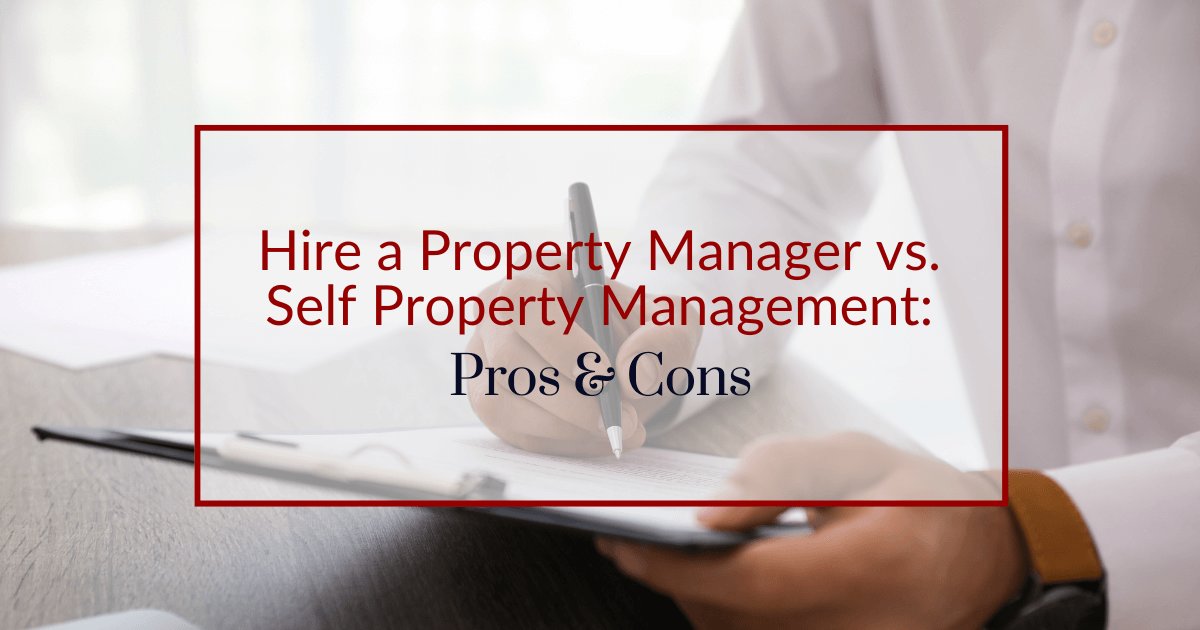Hire a Property Manager vs Self Property Management: Pros & Cons
Posted by Dave Kotler on Wednesday, October 26th, 2022 at 1:20pm.

Multi-family housing can be an excellent way for people to diversify their investment portfolio while generating passive income. However, before purchasing a multi-family property, buyers should consider how they want to manage it. Will they become an on-site landlord or live elsewhere and hire a property management company?
These are big questions because not everyone has the desire or time to be a hands-on landlord. While some buyers prefer using a property management company, others may be thrilled at managing their property. Here's a comparison of these two methods.
What Is a Property Management Company?
A property management company is what its name suggests: a company that manages properties. When someone hires a property manager, the "landlord duties" the company takes on include:
- Screening potential tenants
- Collecting rent and handling delinquencies
- Performing routine maintenance
- Managing invoices and bookkeeping
- Handling tenant complaints
A property manager can save the owner of a multi-family unit time and energy. However, property management companies charge for their services, which could prevent the owner from turning a profit or breaking even. Here are some of the pros and cons of property management companies.
Pros of Property Management Companies
Property management companies tend to have rigorous screening systems. They perform background and credit checks and look at potential tenants' rental history with past landlords. They know what "red flags" to look for when screening potential tenants.
Management companies will have fewer vacancy periods in the rental units. An established property manager has a built-in marketing strategy and can easily find new renters quickly, ensuring minimal vacancy times. They may even maintain a waiting list of potential renters looking to move in.
Finally, a property manager can be a big stress reliever for owners renting their property. They often have a network of maintenance professionals to reduce costs and can quickly respond to maintenance emergencies. Management companies handle all rent collection and deal with delinquent tenants, so the owner does not have to.
Cons of Property Management Companies
The biggest challenge that tends to steer investors away from property management companies is the cost. Most management companies charge anywhere from 8–10% of the monthly rent for their services. Some companies even charge fees on top of the monthly amount, so it's essential to read the contract carefully before hiring one.
Most detail-oriented people may not like the "hands-off" approach of hiring a management company. For example, suppose a leaky kitchen sink needs replacing. The manager might opt for a more affordable replacement faucet that is less stylish than the original, while the owner would prefer a more expensive version. Owners who want to oversee every facet of their investment might not like the experience of working with a manager.
What Is Self-Management?

Self-management means the owner likely lives in one of the multi-family home's units and handles all of the day-to-day landlord duties. All the responsibilities listed above that a property manager handles must be dealt with directly by the owner. Some enjoy this experience, especially if they like to manage every aspect of being a property owner and landlord. Here is a closer look at the pros and cons of self-managing a rental.
Pros of Self-Managing a Rental
Those who manage their investment property don't have to pay a third-party eight to 10% of their monthly rental income. Instead, those funds can go toward maintenance, property taxes, home improvements, or other expenses that come with home ownership.
Self-management also gives owners a greater degree of control over everything. The landlord makes all the necessary decisions. An owner who has difficulty delegating tasks to others will probably enjoy overseeing every aspect of owning and managing an investment property.
Being a hands-on landlord also means the owner will gain a lot of experience in property management. This can be important if they want to expand their real estate holdings by purchasing and renting out more properties. The same issues and duties will apply to new properties and tenants, but the owner will bring more experience to the table. Owners also need to learn many routine maintenance tasks, which will always come in handy.
Cons of Self-Managing a Rental
Self-managing rental property requires a significant amount of time. Dealing with delinquent payments, maintenance, screening, resolving neighbour disputes between tenants, managing the books, and other responsibilities are time-consuming and can prevent the owner from pursuing other interests.
When it comes to emergency maintenance, the owner becomes the first point of contact when self-managing. If the heat goes out at 2 a.m. in the middle of winter, the owner is the first person the tenant calls—and the owner has to respond. Tenant calls will come in at all hours of the night, all year long.
It also requires a certain amount of expertise for those renting to tenants. Knowledge of local regulations and codes is necessary, along with knowledge of routine maintenance tasks like fixing a leaky faucet, replacing a doorknob, or patching holes in drywall. A lack of expertise can create challenges for some owners.
Questions to Help You Decide
There are many things to consider between self-managing a property or hiring a property manager. Here are some helpful questions to ask before deciding:
- How many units does the property have? More units mean more cash flow and more tasks and duties for the manager.
- Will you live in the property? If the owner has no plans to live in one of the units, being a manager becomes more complex, depending on how far away they live. There are also significant financial incentives to living in one of the units as an owner-manager, known as house hacking.
- How much landlord experience do you have? Being a landlord has a steep learning curve, so hiring a property manager might be a better option depending on the owner's comfort level.
- How much time can you commit? Self-managing always requires more time than expected, so it may not realistically work for some types of investors.
Multi-Family Homes Can Be a Great Investment Strategy
No matter how a person decides to manage their property, a multi-family home can be a fantastic way to diversify an investment portfolio. The choice between self-management and hiring a property manager will come from the abovementioned factors. Either way, multi-family homes can potentially be a great source of profit for owners.
Dave Kotler

